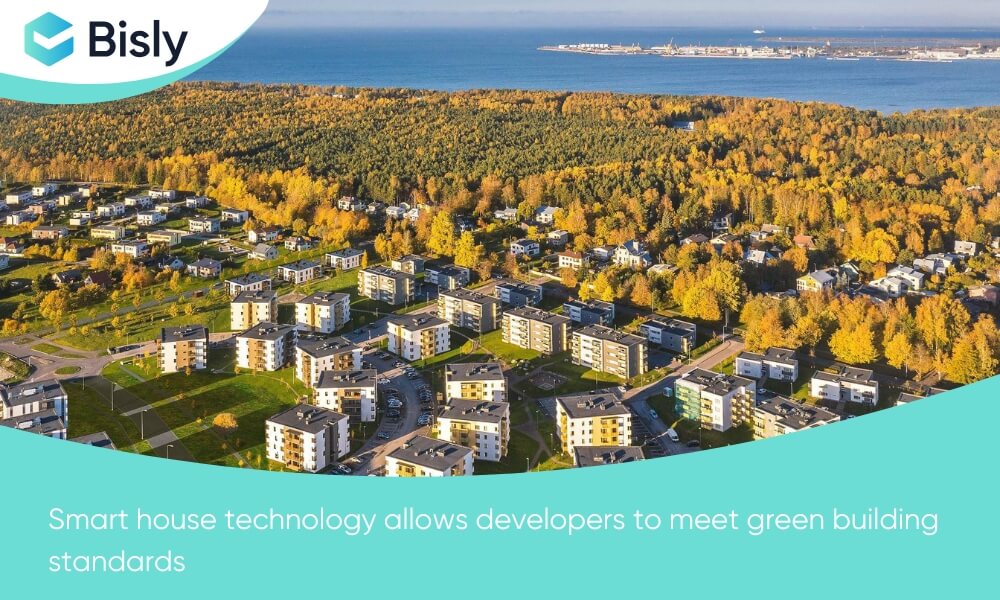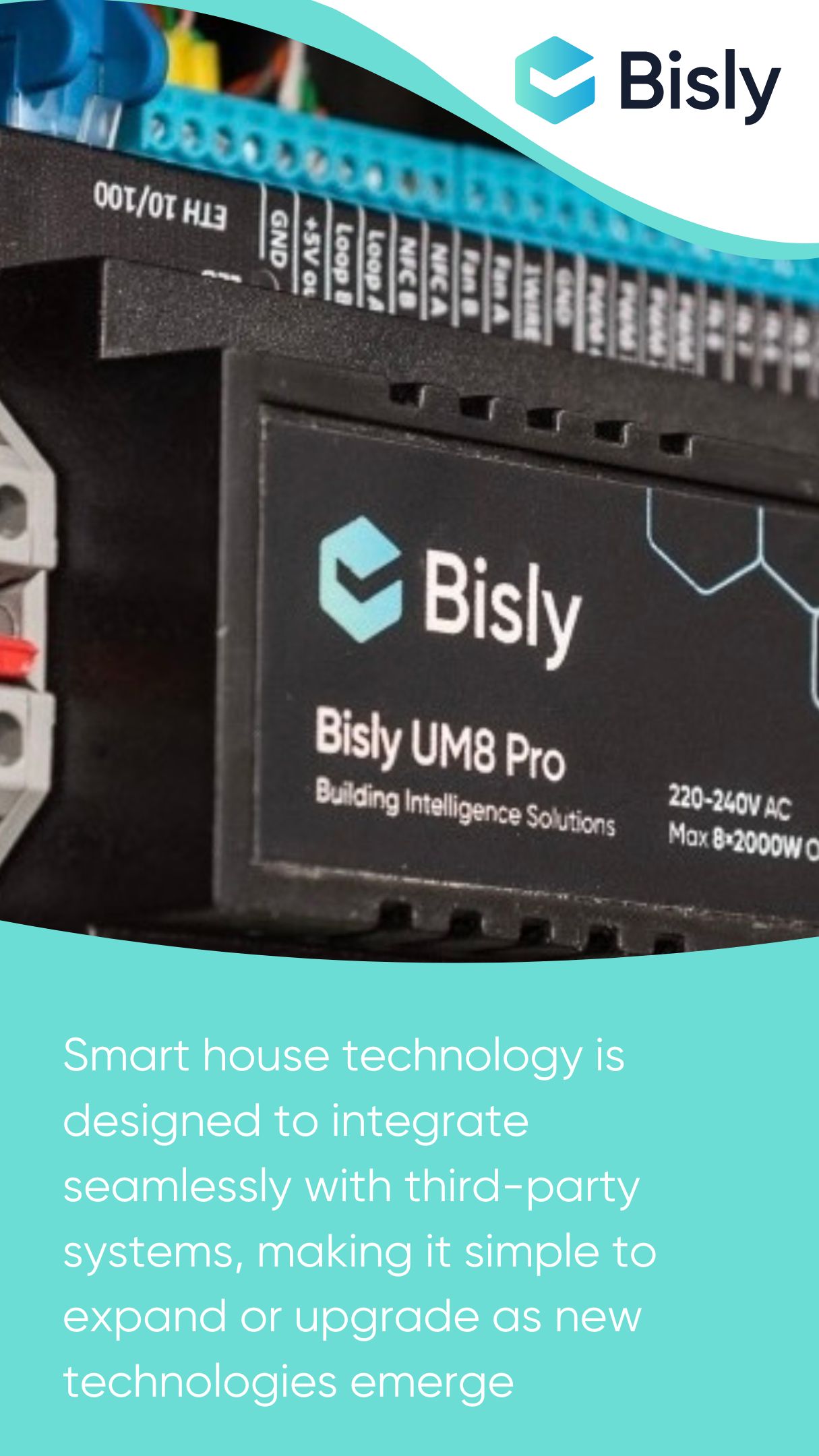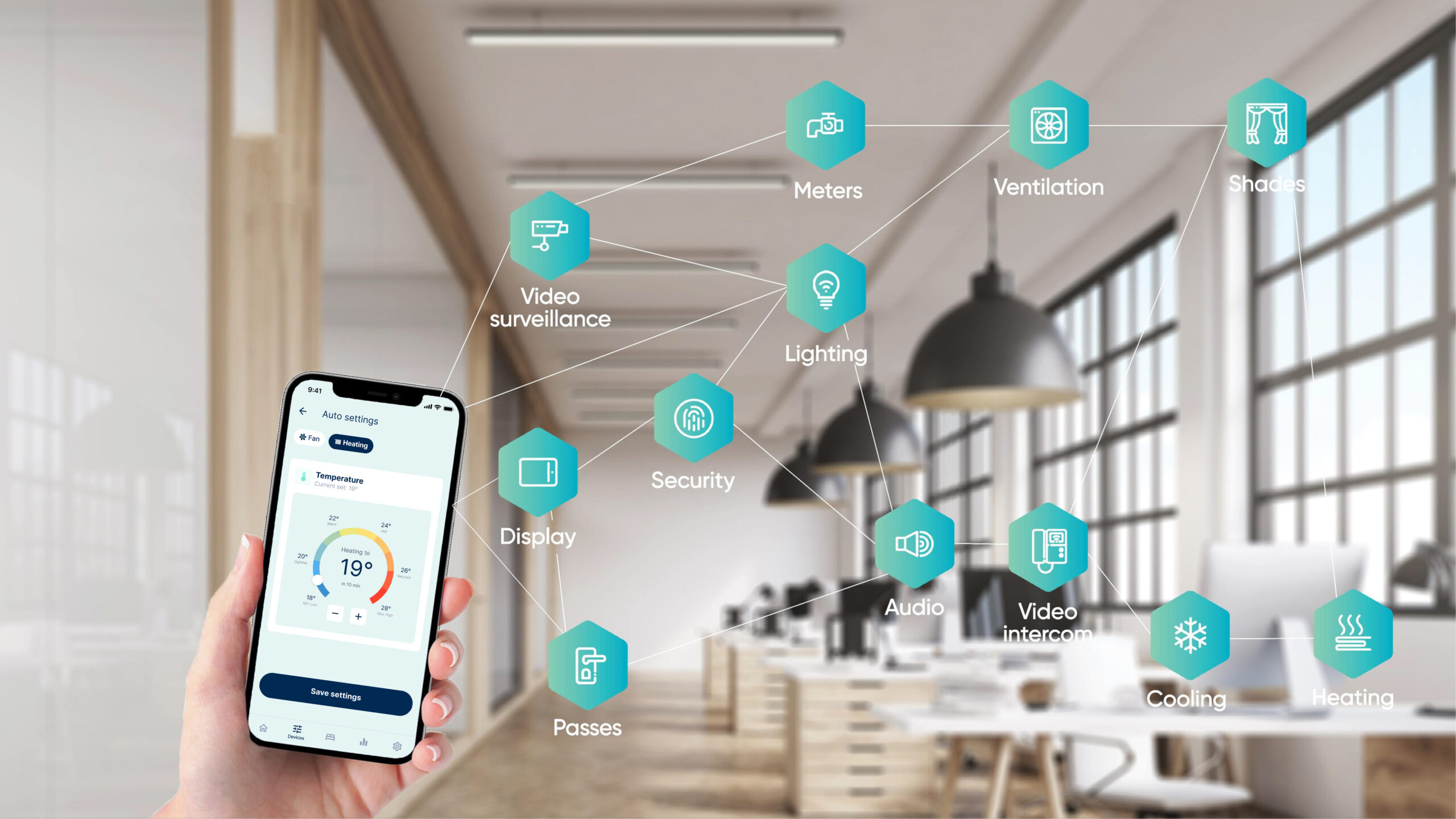In 2025, smart house technology has become an essential part of property development. The innovative approach of smart building solutions brings along a list of benefits for property developers, managers, and residents alike. Including smart house solutions in buildings is not just about automation—it’s about better living, lower costs, and more efficient buildings. Smart house technology brings measurable value, making it the new standard for modern real estate.
Below, you’ll find the 11 main benefits that smart house technology brings along.
1. Remote monitoring and control with smart house technology
One of the biggest benefits that smart house technology brings is remote management. By integrating smart building solutions, users can control lighting, heating, access, and security in just a few clicks on their smartphones wherever they are. Residents enjoy greater living comfort and convenience, adjusting different systems to their preferences.
Building managers and developers benefit from real-time monitoring, allowing them to respond to any issues faster. That means most problems can be resolved before they turn into more serious challenges. The single-platform solution gives managers a full overview of what’s happening across different building systems without having to switch between platforms. Data from each system flows together, giving a full picture of how the building operates at any given moment.
Thanks to remote management, residents enjoy greater control over their home environment, while building managers and developers benefit from reduced maintenance delays and costs. These factors also help to enhance the market appeal of any building where smart house technology is implemented.
2. Enhanced energy efficiency and reduced costs
Smart building solutions are vital for reducing energy waste, especially in regions where heating is a major energy consumer. In Estonia, for example, 60% of primary energy consumption is related to heating. This makes it particularly important to optimise how heating is used. Sensors and automation systems can adjust lighting, heating, and cooling based on real-time occupancy and usage. Lights turn off automatically when a room is empty, and heating systems can be set to follow user preferences or outside temperatures. By targeting the biggest sources of energy consumption, these smart features help lower energy waste and reduce energy bills for residents.
At the same time, smart house technology allows developers to meet green building standards. These certifications are a great way to attract environmentally-conscious buyers and investors. This sustainable approach benefits both developers and residents, while reducing the environmental impact of buildings.

3. Smart house technology improves security
In residential buildings, security is not just a feature – it’s essential. Smart house technology revolutionises home security by integrating cameras, motion detectors, smart locks, intercoms, and remote access control into one intelligent, secure system. Unlike traditional security setups that function in isolation, these systems work together to provide real-time monitoring and instant alerts, giving both residents and building managers full visibility over who enters the building and when – even when they’re away.
By making unauthorised access significantly more difficult and enabling immediate response to any unusual activity, smart house technology doesn’t just monitor – it actively protects. This level of automation and control increases peace of mind, enhances safety for everyone in the building, and makes the property a far less appealing target for intruders.
4. Smart building solutions enable predictive maintenance
As previously mentioned, smart building solutions allow building managers and developers to act fast in case of any issues. However, an even bigger advantage is the fact that smart house technology tracks equipment performance round the clock. It can detect problems before they cause any damage. The cutting-edge system knows when something’s starting to wear out—even before people notice. The system can notify building managers of any lights that need to be changed etc., allowing teams to fix small issues early.
Building managers can plan timely repairs, avoid costly breakdowns, and extend the life of building assets. At the same time, developers save money and preserve property value through smarter infrastructure. All that combined means considerable savings in the long run.
5. Enhanced comfort and personalisation
Smart house technology customises comfort settings based on user preferences. From adjusting lighting intensity to even controlling air quality, smart building solutions adjust the environment to meet individual needs. Residents enjoy enhanced comfort while building managers receive fewer complaints. This type of personalised approach allows people to experience the true meaning of modern luxury living, increasing the market appeal of the building.
This level of intelligent comfort is made possible with solutions like the Bisly Building Automation System (BAS). Bisly enables seamless control of lighting, heating, ventilation, and other comfort settings through a centralised, easy-to-use platform. Its modular and scalable design allows for both apartment-level customisation and full-building integration, giving residents a tailored living experience while making it easy for property managers to monitor and optimise energy use. With Bisly, smart house technology becomes not only accessible but also actually impactful — as seen in premium residential developments like Bismarkstrasse in Düsseldorf or Haga Home in Tallinn.
6. Hassle-free building management with streamlined operations
Traditionally, managing buildings required large teams and constant manual checks. Smart house technology simplifies the job. All systems connect through one interface, which reduces workload and prevents errors. Building managers benefit from centralised control panels monitoring every system in real time.
Bisly’s Building Management System (BMS), makes all critical building systems – from heating and ventilation to energy monitoring and access control – unified into one intuitive platform. The system provides real-time data, remote diagnostics, and detailed analytics, allowing property managers to quickly identify inefficiencies, reduce energy waste, and improve response times. Instead of spending time on routine checks or manual coordination, teams can manage operations more efficiently, increase building performance, and offer better service to residents – all from a single interface.
7. Real-time data provided by smart house technology
Smart house technology collects data about the building 24/7. This includes information about energy use, occupancy, and system performance. This information helps developers and managers to make more informed decisions about any upgrades or necessary repairs. Smart building solutions also reveal patterns that traditional buildings can’t detect, enabling long-term planning based on accurate, real-time insights. This makes smart house technology a great tool for improving overall building performance and lowering expenses.
8. Increased market value and appeal
Buildings equipped with smart house technology come with higher property value and rental rates. According to several studies, buildings where smart building solutions were implemented yielded over 20% increase in market value compared to traditional buildings. Buyers see them as modern, efficient, and future-ready, while renters look for convenience and energy savings. In 2025, both increasingly expect smart building solutions to be the standard, especially in urban and high-end developments.
Developers who integrate smart systems early gain a competitive advantage and meet evolving market demands. Smart building solutions offer a clear long-term edge when it comes to resale value. It’s also worth noting that these properties generally sell or lease faster than outdated buildings.
9. Smart building solutions—empowering sustainability
Smart house technology directly supports sustainability goals. It helps to significantly reduce the environmental impact of buildings. It tracks water usage, cuts down energy waste, and encourages more eco-conscious living all around. Residents can monitor their monthly energy use and adjust their behaviours accordingly.
This also means that smart building solutions make it easier to meet regulatory goals, like the EU Energy Performance of Buildings Directive (EPBD) aimed at achieving a zero-emission status of all new buildings by the end of the decade. Developers integrating such systems qualify for green incentives and certifications. In 2025, green building practices are no longer optional—they’re a vital part of smart development.
10. Seamless integration with other systems
Smart house technology is designed to integrate seamlessly with third-party systems, making it simple to expand or upgrade as new technologies emerge. Buildings with smart infrastructure are inherently future-proof, allowing developers to avoid costly overhauls down the line. Residents benefit by gaining access to modern features without disruption, while the long-term value and functionality of the building remain protected.

11. Enhanced comfort and living experience
Smart house technology enhances much more than individual apartments. It also benefits shared areas in the building. Smart building solutions can manage access to common spaces such as lounges, storage rooms, bike parking, or guest suites. Residents can conveniently book amenities through their smart building app, while managers have a real-time overview of usage. Implementing smart building technology allows people to feel more secure, connected, and empowered.
Setting a new standard with smart house technology
In 2025, smart house technology isn’t optional—it’s the future of residential buildings. It improves comfort, lowers energy use, and strengthens security. Property developers who use smart building solutions gain a considerable advantage in the market, both in value and efficiency.
From data-driven operations to sustainable design, the benefits are clear. The smartest move a developer can make today is building smart.
Make your next project future-ready with Bisly’s smart home automation
If you’d like to include smart home automation in your next project and ensure it’s future-proof, reach out to us today. We will help you turn your vision into reality.

